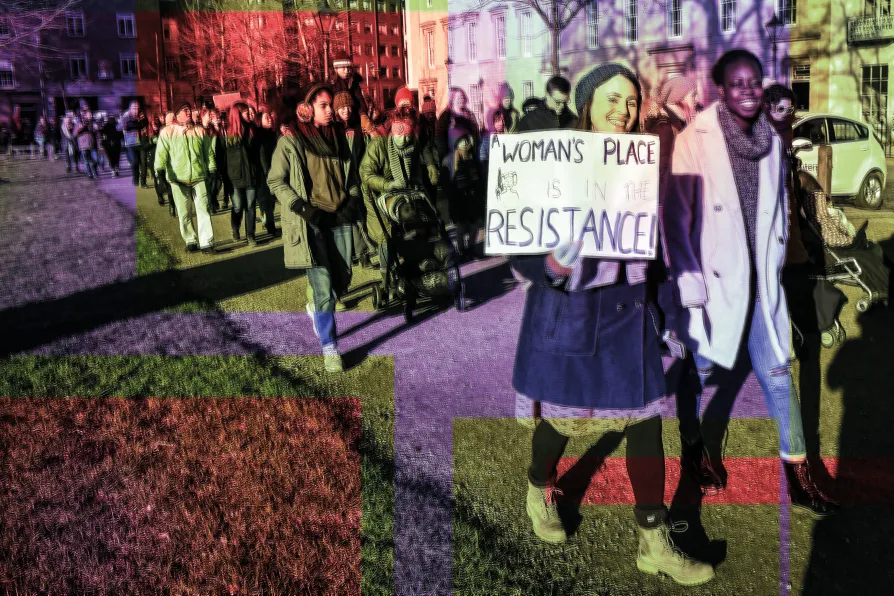RAMZY BAROUD sees Gaza abandoned while the genocide continues
In the face of funding cuts, closures and a shift into women’s centres providing criminal justice-only services rather than a holistic approach, RUTH HUNT urges women to protect existing resources, volunteer and build new networks of support


PROFESSOR Linda Gask, whose latest book, All in Her Mind: How We Are Failing Women’s Mental Health and What Must Change, shares the personal testimonies of women who have been failed by mental health services, has been advocating for more provision for women in their local communities, including women’s centres run by and for women.
Women’s centres are so valuable because women, and especially disadvantaged women, have found it problematic getting access to services.
Often, women find themselves trudging from one service to another, achieving very little. If a woman has health problems or caring responsibilities, simply travelling to these various sites becomes even more of a burden.
The Tavistock report Why Women’s Centres Work: An Evidence Briefing highlights the problem women face accessing mainstream services.
“Mainstream service delivery models do not address the complexity of many women’s lives. To get support, women may need to access multiple and often fragmented services across a range of organisations in different locations. Mainstream services rarely have staff whose training ensures they have an in-depth understanding of the impacts of inequalities, violence and abuse on women’s lives.”
Women’s centres are a place where women can self-refer, and a place where women can access other services, removing the need to travel miles to multiple services.
As well as providing a women-centred, trauma-informed, holistic service, these services can provide access to specialist advocacy services, with advice and support on a variety of issues, such as domestic abuse, mental health issues, criminal justice and welfare rights advice.
Salford women’s centre
Anyone working in the third sector providing resources for women will know the precarious nature of providing that support and keeping funding in place.
One of the more recent and devastating closures has been the Salford women’s centre. This centre was a valuable resource that provided support for women in that area for over 40 years.
It had to close in February after a long and bitter fight to keep it open, having a devastating impact not only on the women the centre served but on wider provision, both informal and formal.
One of the services to come after the closure of Salford women’s centre will be local “live well” hubs, but these are unisex, not women-only spaces.
What has also replaced the women’s centre in Salford is “the effective women’s centres.” This is a partnership between multiple centres across the country, but rather than providing a service for all women. Its key aim is to provide support for women in the criminal justice service.
They describe this aim as follows: “Evidence the effectiveness of women’s centres in holistically addressing the needs of criminal justice-involved and at-risk women and identify the ‘core offer’ that distinguishes the unique support women’s centres provide.”
If the primary aim is criminal justice, the demand could squeeze any other elements of a service, such as mental health support, so much that the “voices” of all these other women won’t be heard, and their needs won’t be met.
If women are forced to attend a women’s centre as a condition of their probation, it removes the key nature of traditional women’s centres, where the choice to use or not use services was down to the woman, not a judge.
After Salford women’s centre had to close, there is no longer anywhere in Salford where women can self-refer themselves to services.
A local mental health service leader commented on the general shift in Greater Manchester to criminal justice-offending-only spaces, or prevention of further offending-spaces.
She said this has led to the dire situation: “There isn’t a safe space for women and their children to go.” Before, when the Salford women’s centre was open, she said: “Women could seek counselling in a women-only space, seek respite from difficult home environments and domestic violence, get food and also develop peer relationships.”
Women’s centres could do both, with access to criminal justice support, just one arm of support offered to women. This makes sense as women often have a lot of interconnected needs, with criminal justice just one of many.
In Stockport, there’s an example of this, with a women’s centre providing both criminal justice services while also providing other services for women in need — stockportwomenscentre.co.uk.
It’s clear that the need for mental health services, sanctuaries, and refuges for women is so great that many women like Gask, who volunteers with a local charity, are calling for women to come together in their own communities to establish support, run by women, for women.
Such services can be built up using existing women’s organisations linking up with other community resources like foodbanks and charities, so services are not starting from scratch.
There are many women who have been through struggles in life. Women who have worked in the caring professions, who have teaching, nursing and medical training or had experience in the statutory, voluntary and charitable sectors. Women who care, who have much knowledge and experience or who just want to make a difference.
Gask said: “Those of us women who can do it need to step up now for other women. We can make things happen, and we can’t wait for men to do it for us. Get involved locally in your women’s organisations. Offer your skills as a volunteer.”
With this current shift into women’s centres providing criminal justice-only spaces, it’s now the time for women in local communities to get involved, to both protect existing resources and to provide help in providing new services.
These women have the key to helping bolster, restore or build resources for women. Services run by and for women.
Ruth F Hunt is a freelance journalist, columnist and author.














